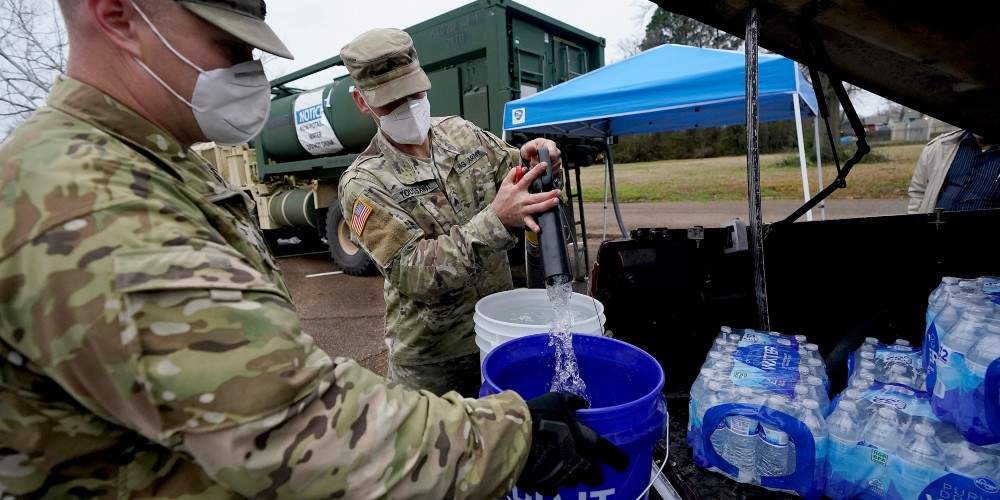Editor’s Commentary: On today’s episode of The JD Rucker Show, I discussed this story below by Kevin Hughes over at Natural News. While it’s clear that between water and electrical grid failures we are starting to enter a very troubling time in America, it’s important to remember that we MUST take charge of our own future. That means breaking away from dependence on government as much as possible, even for expected services like utilities.
Some can get off the grid. Others can only supplement and reduce their dependency. Either way, it’s important that we start tackling this problem as self-reliant individual American citizens immediately. Here’s my show followed by the article by Kevin Hughes…
Don’t just survive — THRIVE! Prepper All-Naturals has freeze-dried steaks for long-term storage. Don’t wait for food shortages to get worse. Stock up today. Use promo code “jdr” at checkout for 35% off!
America’s infrastructure is falling apart, as evidenced by the water shortage in Mississippi and the power grid failure in California.
Residents of Jackson, Mississippi waited in line to obtain water for drinking, bathing, cooking and flushing toilets on Aug. 31 after its water system failed due to the Pearl River’s flooding. A news release from the city said the main water-treatment plant had “challenges with water chemistry,” leading to a dip in water output and a significant drop in water pressure. Prior to the water service disruption, the 150,000 residents of Jackson had been boiling their drinking water as officials warned it could lead to digestive issues.
A day before, Jackson Mayor Chokwe Antar Lumumba said repairing the city’s water system could run to “quite possibly billions of dollars.” He pointed to short staffing and “decades of deferred maintenance” as the culprits for the water system’s deterioration.
Jackson’s predicament is similar to other cities, as it faces water system trouble it can’t afford to repair. Its tax base has crumbled the last few decades as the population declined. The city’s populace is now more than 80 percent Black, with about 25 percent of its people living in poverty.
The state and federal government came to the rescue of Jackson, the Magnolia State’s capital. Mississippi Gov. Tate Reeves announced a state of emergency for Jackson’s water system on Aug. 30, while President Joe Biden authorized an emergency declaration for the state on the same day.
The following day, Biden called Lumumba to talk about response efforts involving the Environmental Protection Agency, the Federal Emergency Management Agency and the Army Corps of Engineers. The president also expressed intent to give Jackson’s aging water infrastructure much-needed federal support.
Meanwhile, Reeves said the state will try to aid Jackson by hiring contractors to work at the O.B. Curtis Water Treatment Plant. The facility, which was the root of Jackson’s water miseries, had been operating at reduced capacity with backup pumps after the principal pumps failed. The Mississippi Emergency Management Agency later posted footage of an emergency rental pump being installed in the water treatment facility on Twitter.
California power grid on the brink of collapse
Meanwhile, the California Independent System Operator (CAISO) circulated a level 1 energy emergency alert quickly after tapping all its accessible power supplies.
Californians, despite prior warnings to decrease usage, decided to charge their electric vehicles. This subsequently drove demand beyond capacity. (Related: Blackout risk in California: EV owners told to avoid charging their vehicles or the power grid might collapse.)
“It is pretty clear Mother Nature has outrun us. The reality is we’re living in an age of extremes – extreme heat, extreme drought,” California Gov. Gavin Newsom stated during a news conference. He also released an executive order on Aug. 31 to free up emergency power supplies.
Officials urged residents to reduce power use between 4 p.m. and 9 p.m. as temperatures rose beyond 100 degrees Fahrenheit.
The heat presents the largest test to the grid since the summer of 2020, when rotating outages overwhelmed parts of the state.
Follow WaterWars.news for more news about the water crisis in America.
Watch the video below to know why Jackson, Mississippi blames the “White Flight” for water crisis.
This video is from the InfoWars channel on Brighteon.com.
More related stories:
- Ring the ALARM! Today’s water crisis isn’t a fire drill – It’s apocalyptic.
- Federal government forces water supply cuts for Arizona, New Mexico and Mexico to avoid collapse of Colorado River System.
- Flint’s lead-contaminated water caused deadly outbreak of respiratory disease that killed 12, says new report.
- India faces water crisis as major tributaries are almost dried up.
- Water crisis in Corpus Christi, TX: ‘Unknown’ chemicals contaminate drinking water.
Sources include:




Infrastructure is so bad in Whitmer’s Michigan that pedestrians are falling through pedestrian walkways onto highways. This after Whitmer fixed the damn roads.
https://www.clickondetroit.com/video/local-news/2022/05/17/man-falls-through-lodge-pedestrian-bridge/